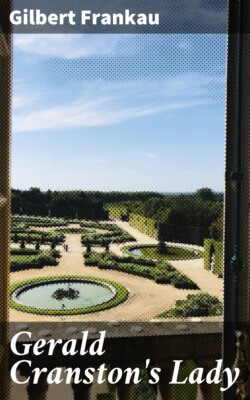Читать книгу Gerald Cranston's Lady - Gilbert Frankau - Страница 11
На сайте Литреса книга снята с продажи.
2
ОглавлениеTable of Contents
Already, as the two tall brothers passed under Caxton’s window toward St. Margaret’s vestry, they could see, between the gray pillars, where the stained-glass windows turned the gold of slanting sunlight-shafts to emeralds and rubies, little knots of men and women filing right and left into the brown pews. Already as, entering the vestry, they found the lady clerk at her big leather-covered table, organ music began.
To Harold’s imagination, that music preluded a nerve-wracking torture. He felt himself, in his own words, “growing hot all over.” His hands shook. His mind dithered. But the bridegroom seemed to have no nerves, no imagination. Quietly, courteously, interestedly, he spoke with the lady clerk, with the gray-haired canon, her father, with the old verger, with the older vestry-woman. Disciplined always, he appeared to surrender himself without any difficulty to the discipline of these people, in whose creed, as Harold well knew, his faith had never been more than perfunctory. “With your permission, sir,” he said to the canon, “I’d like my brother to ascertain if my mother has arrived.”
Harold went out in trepidation, to return whispering, “Yes, Mother’s there; and I never saw so many people in my life, Gerry”; and a moment or so later, having memorized his final instructions, followed bridegroom and verger out of the vestry into the ruby-slanting sunlight-shafts.
By now, except for the women’s hats and an occasional kneeler, St. Margaret’s might have been a theater. From chancel to west window, the nave showed row on packed row of curious faces. The north aisle had already filled, and the south was fast filling. Low-voiced chatter mingled decorous with the organ music as Gerald Cranston rounded the flower-decorated lectern to greet the little, quietly dressed person with the lined homely face and the tired blue eyes who was his mother.
There was nothing of the actor about that greeting. He did not kiss her. He did not even take her hand. Personal demonstrativeness, whether in public or in private, had never been their habit. In his direct, “So you got here in plenty of time, Mother,” as in her whispered, “Yes, I was here in time to see you and Harold come in,” there sounded no note of surface emotion. Yet when the big man in the fashionable wedding-garments bent over that insignificant figure in the front pew, it seemed, and rightly, to the tensed and imaginative Harold, as though from him to her there issued a gruff protective tenderness; and when, at a word from the verger, the big man, straightening himself, stepped deliberately to his allotted place, a little of their tiredness—Harold could see—had gone from those tired blue eyes.
